Analyzing Sustainable Tourism and Environment in the UK
VerifiedAdded on 2023/06/08
|9
|2554
|291
Essay
AI Summary
This essay provides an overview of the tourism industry in the United Kingdom, emphasizing its sustainable development through various principles and practices. It examines the role of stakeholders in decision-making processes related to tourism and identifies key macro-environmental factors such as political, economic, social, technological, legal, and environmental elements that contribute to the sustainable growth of tourism in the UK. Additionally, the essay discusses micro-environmental factors and motivational aspects influencing the demand for tourism products, highlighting the importance of both extrinsic and intrinsic motivation in the tourism sector. The analysis concludes by underscoring the significance of understanding employee needs and motivations to foster effective operations within the tourism department, contributing to the overall development and sustainability of the industry in the UK. Desklib offers a platform to explore similar documents and study resources.
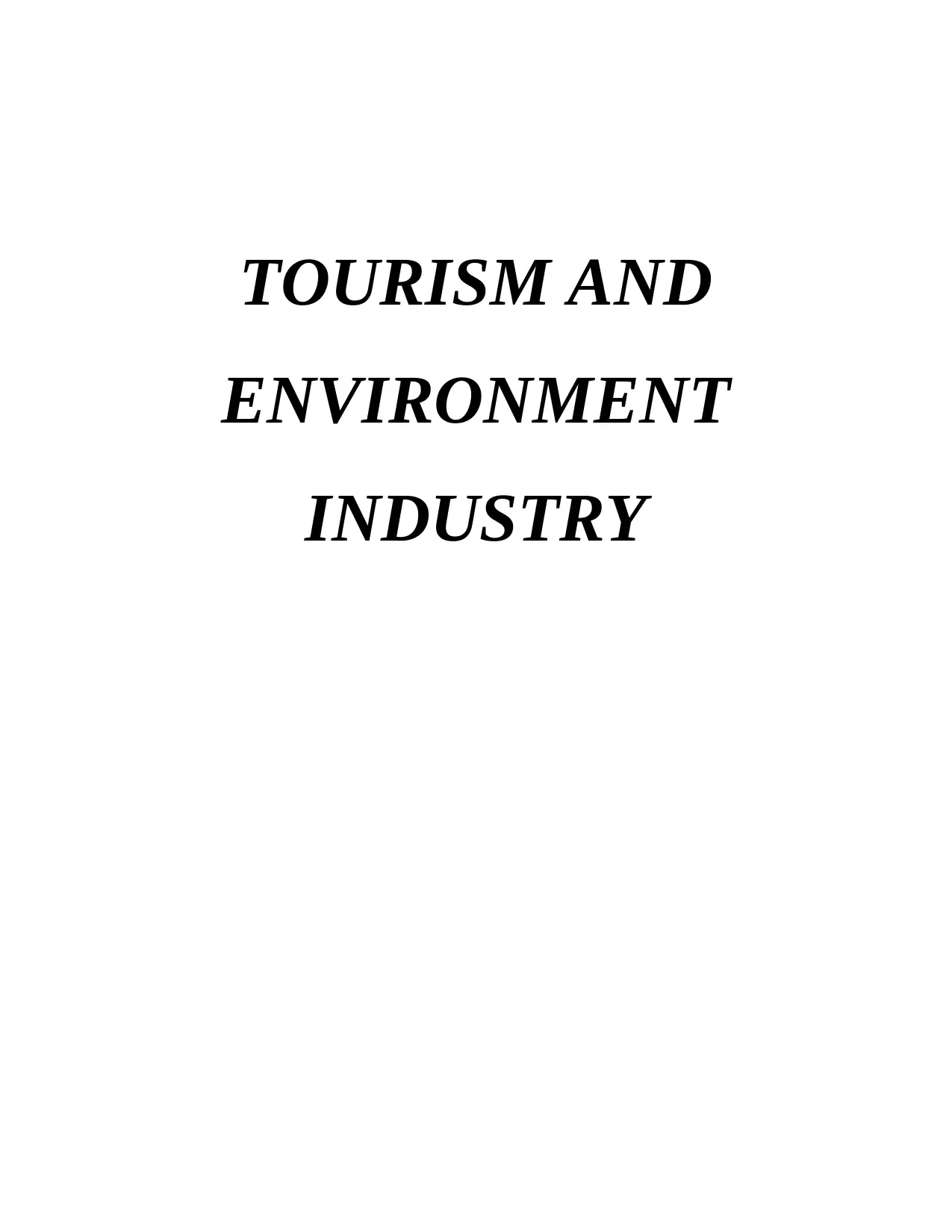
TOURISM AND
ENVIRONMENT
INDUSTRY
ENVIRONMENT
INDUSTRY
Paraphrase This Document
Need a fresh take? Get an instant paraphrase of this document with our AI Paraphraser
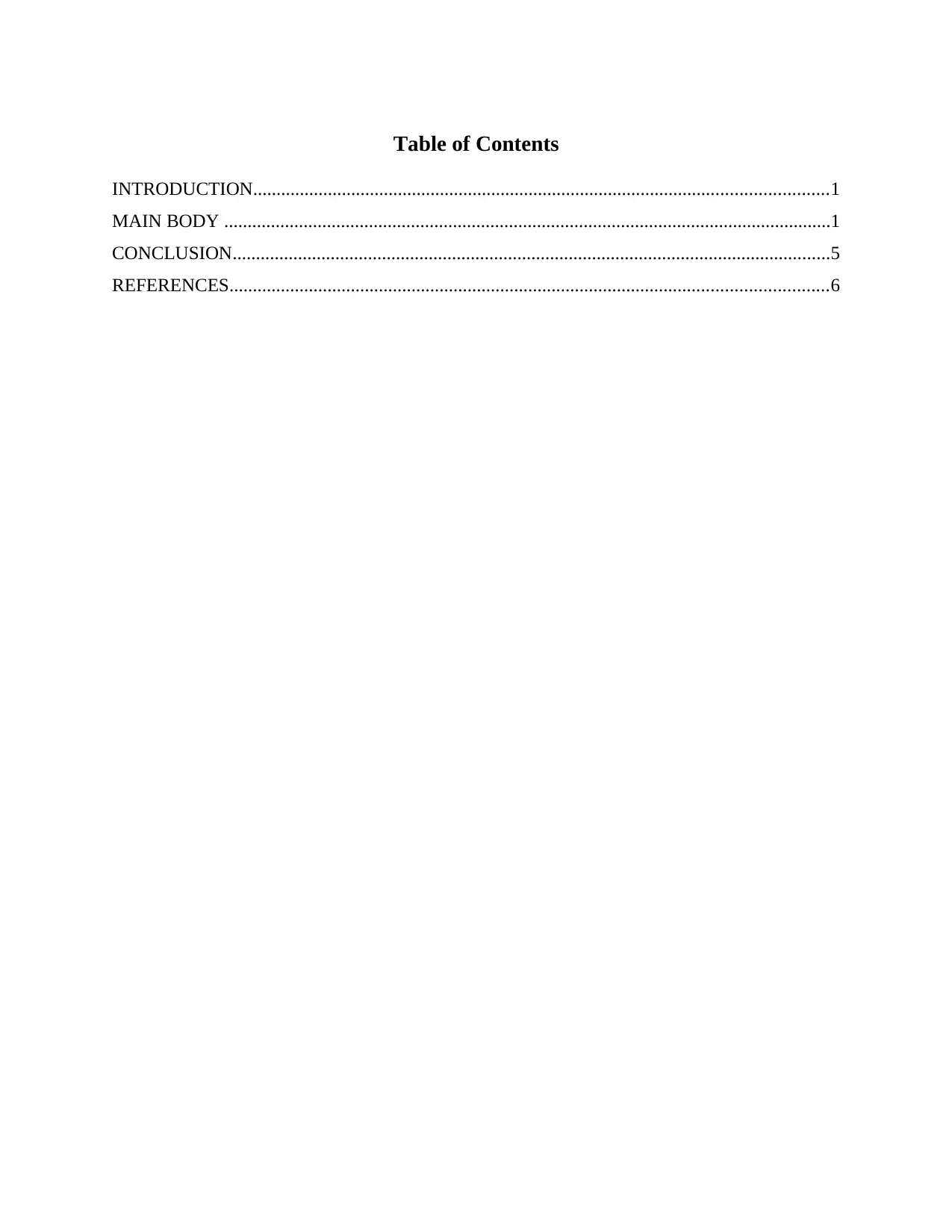
Table of Contents
INTRODUCTION...........................................................................................................................1
MAIN BODY ..................................................................................................................................1
CONCLUSION................................................................................................................................5
REFERENCES................................................................................................................................6
INTRODUCTION...........................................................................................................................1
MAIN BODY ..................................................................................................................................1
CONCLUSION................................................................................................................................5
REFERENCES................................................................................................................................6
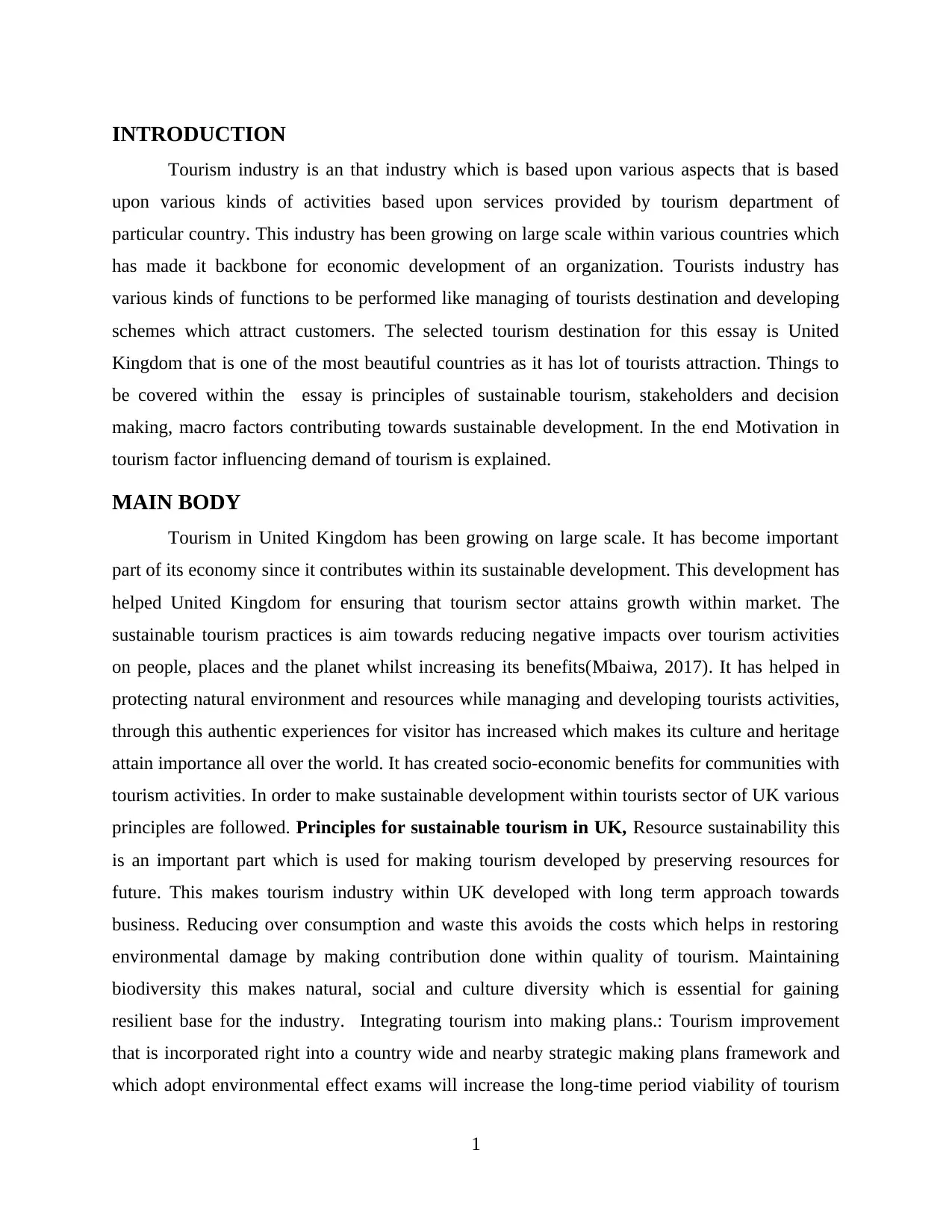
INTRODUCTION
Tourism industry is an that industry which is based upon various aspects that is based
upon various kinds of activities based upon services provided by tourism department of
particular country. This industry has been growing on large scale within various countries which
has made it backbone for economic development of an organization. Tourists industry has
various kinds of functions to be performed like managing of tourists destination and developing
schemes which attract customers. The selected tourism destination for this essay is United
Kingdom that is one of the most beautiful countries as it has lot of tourists attraction. Things to
be covered within the essay is principles of sustainable tourism, stakeholders and decision
making, macro factors contributing towards sustainable development. In the end Motivation in
tourism factor influencing demand of tourism is explained.
MAIN BODY
Tourism in United Kingdom has been growing on large scale. It has become important
part of its economy since it contributes within its sustainable development. This development has
helped United Kingdom for ensuring that tourism sector attains growth within market. The
sustainable tourism practices is aim towards reducing negative impacts over tourism activities
on people, places and the planet whilst increasing its benefits(Mbaiwa, 2017). It has helped in
protecting natural environment and resources while managing and developing tourists activities,
through this authentic experiences for visitor has increased which makes its culture and heritage
attain importance all over the world. It has created socio-economic benefits for communities with
tourism activities. In order to make sustainable development within tourists sector of UK various
principles are followed. Principles for sustainable tourism in UK, Resource sustainability this
is an important part which is used for making tourism developed by preserving resources for
future. This makes tourism industry within UK developed with long term approach towards
business. Reducing over consumption and waste this avoids the costs which helps in restoring
environmental damage by making contribution done within quality of tourism. Maintaining
biodiversity this makes natural, social and culture diversity which is essential for gaining
resilient base for the industry. Integrating tourism into making plans.: Tourism improvement
that is incorporated right into a country wide and nearby strategic making plans framework and
which adopt environmental effect exams will increase the long-time period viability of tourism
1
Tourism industry is an that industry which is based upon various aspects that is based
upon various kinds of activities based upon services provided by tourism department of
particular country. This industry has been growing on large scale within various countries which
has made it backbone for economic development of an organization. Tourists industry has
various kinds of functions to be performed like managing of tourists destination and developing
schemes which attract customers. The selected tourism destination for this essay is United
Kingdom that is one of the most beautiful countries as it has lot of tourists attraction. Things to
be covered within the essay is principles of sustainable tourism, stakeholders and decision
making, macro factors contributing towards sustainable development. In the end Motivation in
tourism factor influencing demand of tourism is explained.
MAIN BODY
Tourism in United Kingdom has been growing on large scale. It has become important
part of its economy since it contributes within its sustainable development. This development has
helped United Kingdom for ensuring that tourism sector attains growth within market. The
sustainable tourism practices is aim towards reducing negative impacts over tourism activities
on people, places and the planet whilst increasing its benefits(Mbaiwa, 2017). It has helped in
protecting natural environment and resources while managing and developing tourists activities,
through this authentic experiences for visitor has increased which makes its culture and heritage
attain importance all over the world. It has created socio-economic benefits for communities with
tourism activities. In order to make sustainable development within tourists sector of UK various
principles are followed. Principles for sustainable tourism in UK, Resource sustainability this
is an important part which is used for making tourism developed by preserving resources for
future. This makes tourism industry within UK developed with long term approach towards
business. Reducing over consumption and waste this avoids the costs which helps in restoring
environmental damage by making contribution done within quality of tourism. Maintaining
biodiversity this makes natural, social and culture diversity which is essential for gaining
resilient base for the industry. Integrating tourism into making plans.: Tourism improvement
that is incorporated right into a country wide and nearby strategic making plans framework and
which adopt environmental effect exams will increase the long-time period viability of tourism
1
⊘ This is a preview!⊘
Do you want full access?
Subscribe today to unlock all pages.

Trusted by 1+ million students worldwide
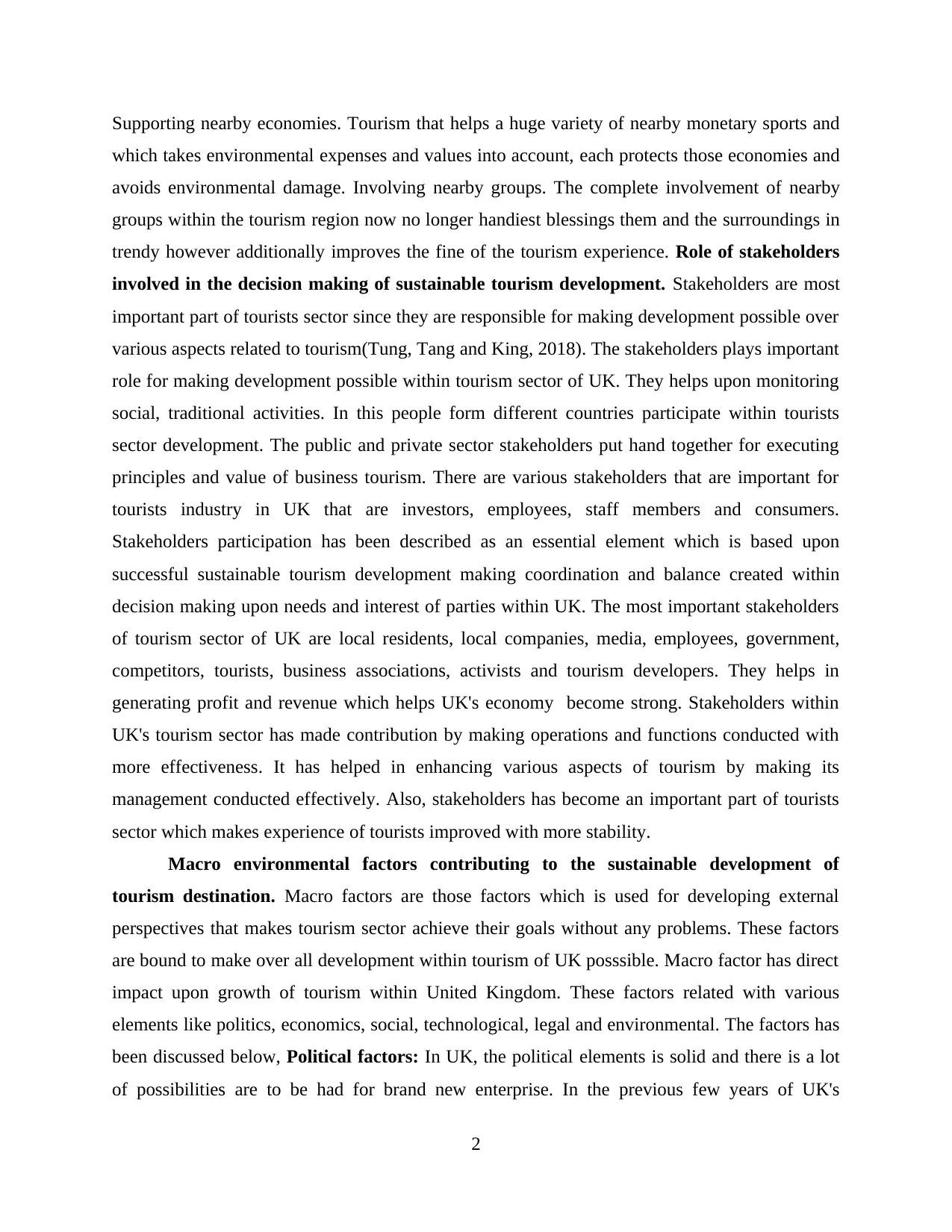
Supporting nearby economies. Tourism that helps a huge variety of nearby monetary sports and
which takes environmental expenses and values into account, each protects those economies and
avoids environmental damage. Involving nearby groups. The complete involvement of nearby
groups within the tourism region now no longer handiest blessings them and the surroundings in
trendy however additionally improves the fine of the tourism experience. Role of stakeholders
involved in the decision making of sustainable tourism development. Stakeholders are most
important part of tourists sector since they are responsible for making development possible over
various aspects related to tourism(Tung, Tang and King, 2018). The stakeholders plays important
role for making development possible within tourism sector of UK. They helps upon monitoring
social, traditional activities. In this people form different countries participate within tourists
sector development. The public and private sector stakeholders put hand together for executing
principles and value of business tourism. There are various stakeholders that are important for
tourists industry in UK that are investors, employees, staff members and consumers.
Stakeholders participation has been described as an essential element which is based upon
successful sustainable tourism development making coordination and balance created within
decision making upon needs and interest of parties within UK. The most important stakeholders
of tourism sector of UK are local residents, local companies, media, employees, government,
competitors, tourists, business associations, activists and tourism developers. They helps in
generating profit and revenue which helps UK's economy become strong. Stakeholders within
UK's tourism sector has made contribution by making operations and functions conducted with
more effectiveness. It has helped in enhancing various aspects of tourism by making its
management conducted effectively. Also, stakeholders has become an important part of tourists
sector which makes experience of tourists improved with more stability.
Macro environmental factors contributing to the sustainable development of
tourism destination. Macro factors are those factors which is used for developing external
perspectives that makes tourism sector achieve their goals without any problems. These factors
are bound to make over all development within tourism of UK posssible. Macro factor has direct
impact upon growth of tourism within United Kingdom. These factors related with various
elements like politics, economics, social, technological, legal and environmental. The factors has
been discussed below, Political factors: In UK, the political elements is solid and there is a lot
of possibilities are to be had for brand new enterprise. In the previous few years of UK's
2
which takes environmental expenses and values into account, each protects those economies and
avoids environmental damage. Involving nearby groups. The complete involvement of nearby
groups within the tourism region now no longer handiest blessings them and the surroundings in
trendy however additionally improves the fine of the tourism experience. Role of stakeholders
involved in the decision making of sustainable tourism development. Stakeholders are most
important part of tourists sector since they are responsible for making development possible over
various aspects related to tourism(Tung, Tang and King, 2018). The stakeholders plays important
role for making development possible within tourism sector of UK. They helps upon monitoring
social, traditional activities. In this people form different countries participate within tourists
sector development. The public and private sector stakeholders put hand together for executing
principles and value of business tourism. There are various stakeholders that are important for
tourists industry in UK that are investors, employees, staff members and consumers.
Stakeholders participation has been described as an essential element which is based upon
successful sustainable tourism development making coordination and balance created within
decision making upon needs and interest of parties within UK. The most important stakeholders
of tourism sector of UK are local residents, local companies, media, employees, government,
competitors, tourists, business associations, activists and tourism developers. They helps in
generating profit and revenue which helps UK's economy become strong. Stakeholders within
UK's tourism sector has made contribution by making operations and functions conducted with
more effectiveness. It has helped in enhancing various aspects of tourism by making its
management conducted effectively. Also, stakeholders has become an important part of tourists
sector which makes experience of tourists improved with more stability.
Macro environmental factors contributing to the sustainable development of
tourism destination. Macro factors are those factors which is used for developing external
perspectives that makes tourism sector achieve their goals without any problems. These factors
are bound to make over all development within tourism of UK posssible. Macro factor has direct
impact upon growth of tourism within United Kingdom. These factors related with various
elements like politics, economics, social, technological, legal and environmental. The factors has
been discussed below, Political factors: In UK, the political elements is solid and there is a lot
of possibilities are to be had for brand new enterprise. In the previous few years of UK's
2
Paraphrase This Document
Need a fresh take? Get an instant paraphrase of this document with our AI Paraphraser
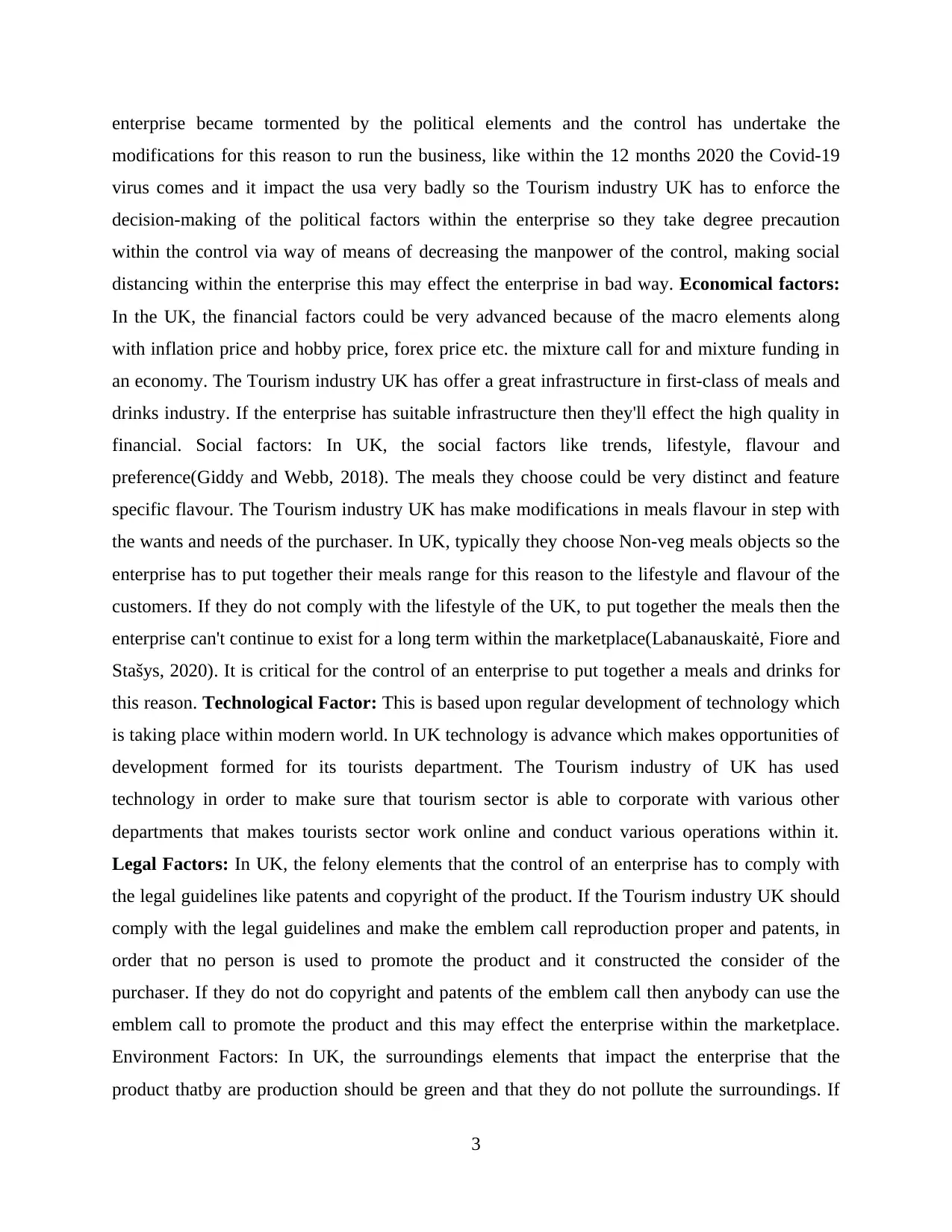
enterprise became tormented by the political elements and the control has undertake the
modifications for this reason to run the business, like within the 12 months 2020 the Covid-19
virus comes and it impact the usa very badly so the Tourism industry UK has to enforce the
decision-making of the political factors within the enterprise so they take degree precaution
within the control via way of means of decreasing the manpower of the control, making social
distancing within the enterprise this may effect the enterprise in bad way. Economical factors:
In the UK, the financial factors could be very advanced because of the macro elements along
with inflation price and hobby price, forex price etc. the mixture call for and mixture funding in
an economy. The Tourism industry UK has offer a great infrastructure in first-class of meals and
drinks industry. If the enterprise has suitable infrastructure then they'll effect the high quality in
financial. Social factors: In UK, the social factors like trends, lifestyle, flavour and
preference(Giddy and Webb, 2018). The meals they choose could be very distinct and feature
specific flavour. The Tourism industry UK has make modifications in meals flavour in step with
the wants and needs of the purchaser. In UK, typically they choose Non-veg meals objects so the
enterprise has to put together their meals range for this reason to the lifestyle and flavour of the
customers. If they do not comply with the lifestyle of the UK, to put together the meals then the
enterprise can't continue to exist for a long term within the marketplace(Labanauskaitė, Fiore and
Stašys, 2020). It is critical for the control of an enterprise to put together a meals and drinks for
this reason. Technological Factor: This is based upon regular development of technology which
is taking place within modern world. In UK technology is advance which makes opportunities of
development formed for its tourists department. The Tourism industry of UK has used
technology in order to make sure that tourism sector is able to corporate with various other
departments that makes tourists sector work online and conduct various operations within it.
Legal Factors: In UK, the felony elements that the control of an enterprise has to comply with
the legal guidelines like patents and copyright of the product. If the Tourism industry UK should
comply with the legal guidelines and make the emblem call reproduction proper and patents, in
order that no person is used to promote the product and it constructed the consider of the
purchaser. If they do not do copyright and patents of the emblem call then anybody can use the
emblem call to promote the product and this may effect the enterprise within the marketplace.
Environment Factors: In UK, the surroundings elements that impact the enterprise that the
product thatby are production should be green and that they do not pollute the surroundings. If
3
modifications for this reason to run the business, like within the 12 months 2020 the Covid-19
virus comes and it impact the usa very badly so the Tourism industry UK has to enforce the
decision-making of the political factors within the enterprise so they take degree precaution
within the control via way of means of decreasing the manpower of the control, making social
distancing within the enterprise this may effect the enterprise in bad way. Economical factors:
In the UK, the financial factors could be very advanced because of the macro elements along
with inflation price and hobby price, forex price etc. the mixture call for and mixture funding in
an economy. The Tourism industry UK has offer a great infrastructure in first-class of meals and
drinks industry. If the enterprise has suitable infrastructure then they'll effect the high quality in
financial. Social factors: In UK, the social factors like trends, lifestyle, flavour and
preference(Giddy and Webb, 2018). The meals they choose could be very distinct and feature
specific flavour. The Tourism industry UK has make modifications in meals flavour in step with
the wants and needs of the purchaser. In UK, typically they choose Non-veg meals objects so the
enterprise has to put together their meals range for this reason to the lifestyle and flavour of the
customers. If they do not comply with the lifestyle of the UK, to put together the meals then the
enterprise can't continue to exist for a long term within the marketplace(Labanauskaitė, Fiore and
Stašys, 2020). It is critical for the control of an enterprise to put together a meals and drinks for
this reason. Technological Factor: This is based upon regular development of technology which
is taking place within modern world. In UK technology is advance which makes opportunities of
development formed for its tourists department. The Tourism industry of UK has used
technology in order to make sure that tourism sector is able to corporate with various other
departments that makes tourists sector work online and conduct various operations within it.
Legal Factors: In UK, the felony elements that the control of an enterprise has to comply with
the legal guidelines like patents and copyright of the product. If the Tourism industry UK should
comply with the legal guidelines and make the emblem call reproduction proper and patents, in
order that no person is used to promote the product and it constructed the consider of the
purchaser. If they do not do copyright and patents of the emblem call then anybody can use the
emblem call to promote the product and this may effect the enterprise within the marketplace.
Environment Factors: In UK, the surroundings elements that impact the enterprise that the
product thatby are production should be green and that they do not pollute the surroundings. If
3
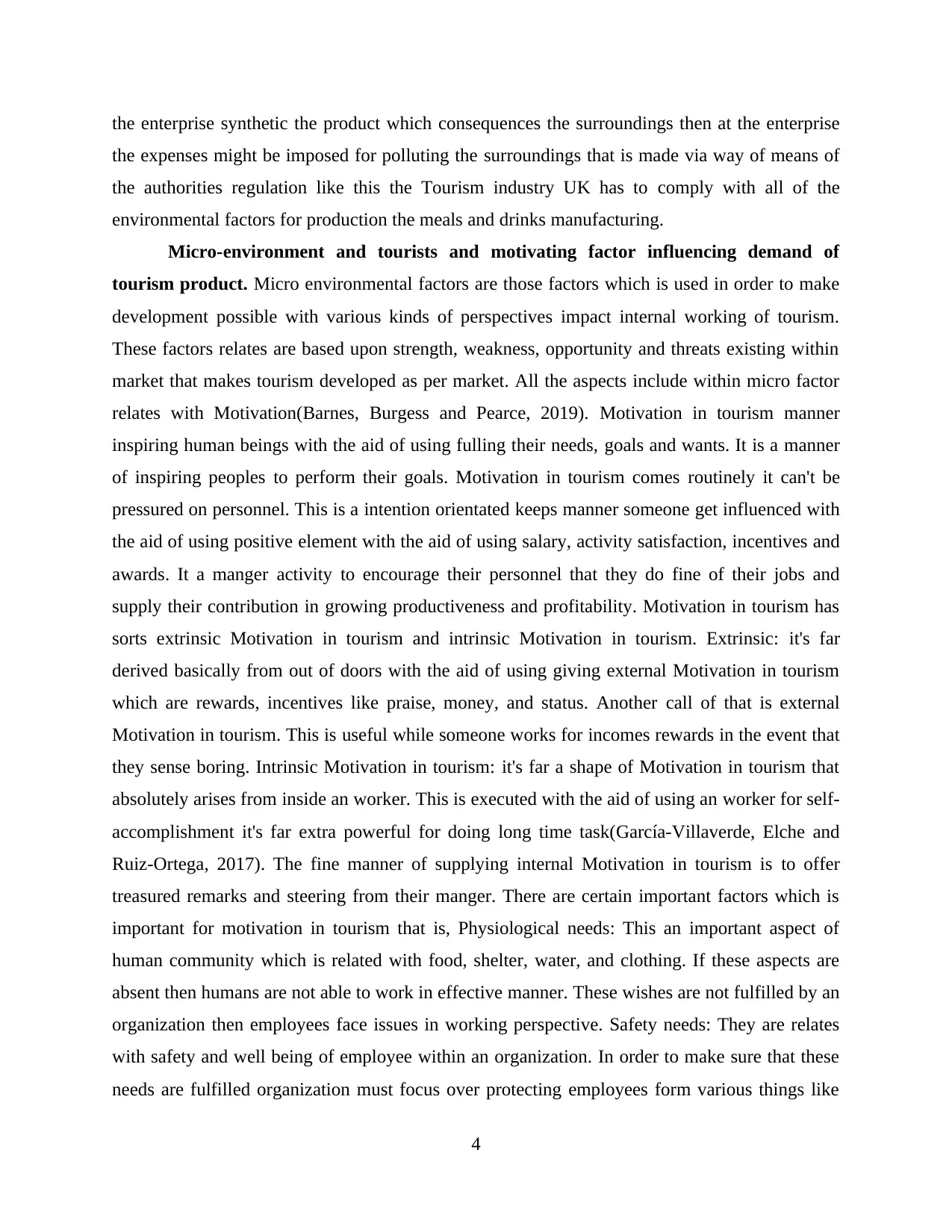
the enterprise synthetic the product which consequences the surroundings then at the enterprise
the expenses might be imposed for polluting the surroundings that is made via way of means of
the authorities regulation like this the Tourism industry UK has to comply with all of the
environmental factors for production the meals and drinks manufacturing.
Micro-environment and tourists and motivating factor influencing demand of
tourism product. Micro environmental factors are those factors which is used in order to make
development possible with various kinds of perspectives impact internal working of tourism.
These factors relates are based upon strength, weakness, opportunity and threats existing within
market that makes tourism developed as per market. All the aspects include within micro factor
relates with Motivation(Barnes, Burgess and Pearce, 2019). Motivation in tourism manner
inspiring human beings with the aid of using fulling their needs, goals and wants. It is a manner
of inspiring peoples to perform their goals. Motivation in tourism comes routinely it can't be
pressured on personnel. This is a intention orientated keeps manner someone get influenced with
the aid of using positive element with the aid of using salary, activity satisfaction, incentives and
awards. It a manger activity to encourage their personnel that they do fine of their jobs and
supply their contribution in growing productiveness and profitability. Motivation in tourism has
sorts extrinsic Motivation in tourism and intrinsic Motivation in tourism. Extrinsic: it's far
derived basically from out of doors with the aid of using giving external Motivation in tourism
which are rewards, incentives like praise, money, and status. Another call of that is external
Motivation in tourism. This is useful while someone works for incomes rewards in the event that
they sense boring. Intrinsic Motivation in tourism: it's far a shape of Motivation in tourism that
absolutely arises from inside an worker. This is executed with the aid of using an worker for self-
accomplishment it's far extra powerful for doing long time task(García-Villaverde, Elche and
Ruiz-Ortega, 2017). The fine manner of supplying internal Motivation in tourism is to offer
treasured remarks and steering from their manger. There are certain important factors which is
important for motivation in tourism that is, Physiological needs: This an important aspect of
human community which is related with food, shelter, water, and clothing. If these aspects are
absent then humans are not able to work in effective manner. These wishes are not fulfilled by an
organization then employees face issues in working perspective. Safety needs: They are relates
with safety and well being of employee within an organization. In order to make sure that these
needs are fulfilled organization must focus over protecting employees form various things like
4
the expenses might be imposed for polluting the surroundings that is made via way of means of
the authorities regulation like this the Tourism industry UK has to comply with all of the
environmental factors for production the meals and drinks manufacturing.
Micro-environment and tourists and motivating factor influencing demand of
tourism product. Micro environmental factors are those factors which is used in order to make
development possible with various kinds of perspectives impact internal working of tourism.
These factors relates are based upon strength, weakness, opportunity and threats existing within
market that makes tourism developed as per market. All the aspects include within micro factor
relates with Motivation(Barnes, Burgess and Pearce, 2019). Motivation in tourism manner
inspiring human beings with the aid of using fulling their needs, goals and wants. It is a manner
of inspiring peoples to perform their goals. Motivation in tourism comes routinely it can't be
pressured on personnel. This is a intention orientated keeps manner someone get influenced with
the aid of using positive element with the aid of using salary, activity satisfaction, incentives and
awards. It a manger activity to encourage their personnel that they do fine of their jobs and
supply their contribution in growing productiveness and profitability. Motivation in tourism has
sorts extrinsic Motivation in tourism and intrinsic Motivation in tourism. Extrinsic: it's far
derived basically from out of doors with the aid of using giving external Motivation in tourism
which are rewards, incentives like praise, money, and status. Another call of that is external
Motivation in tourism. This is useful while someone works for incomes rewards in the event that
they sense boring. Intrinsic Motivation in tourism: it's far a shape of Motivation in tourism that
absolutely arises from inside an worker. This is executed with the aid of using an worker for self-
accomplishment it's far extra powerful for doing long time task(García-Villaverde, Elche and
Ruiz-Ortega, 2017). The fine manner of supplying internal Motivation in tourism is to offer
treasured remarks and steering from their manger. There are certain important factors which is
important for motivation in tourism that is, Physiological needs: This an important aspect of
human community which is related with food, shelter, water, and clothing. If these aspects are
absent then humans are not able to work in effective manner. These wishes are not fulfilled by an
organization then employees face issues in working perspective. Safety needs: They are relates
with safety and well being of employee within an organization. In order to make sure that these
needs are fulfilled organization must focus over protecting employees form various things like
4
⊘ This is a preview!⊘
Do you want full access?
Subscribe today to unlock all pages.

Trusted by 1+ million students worldwide
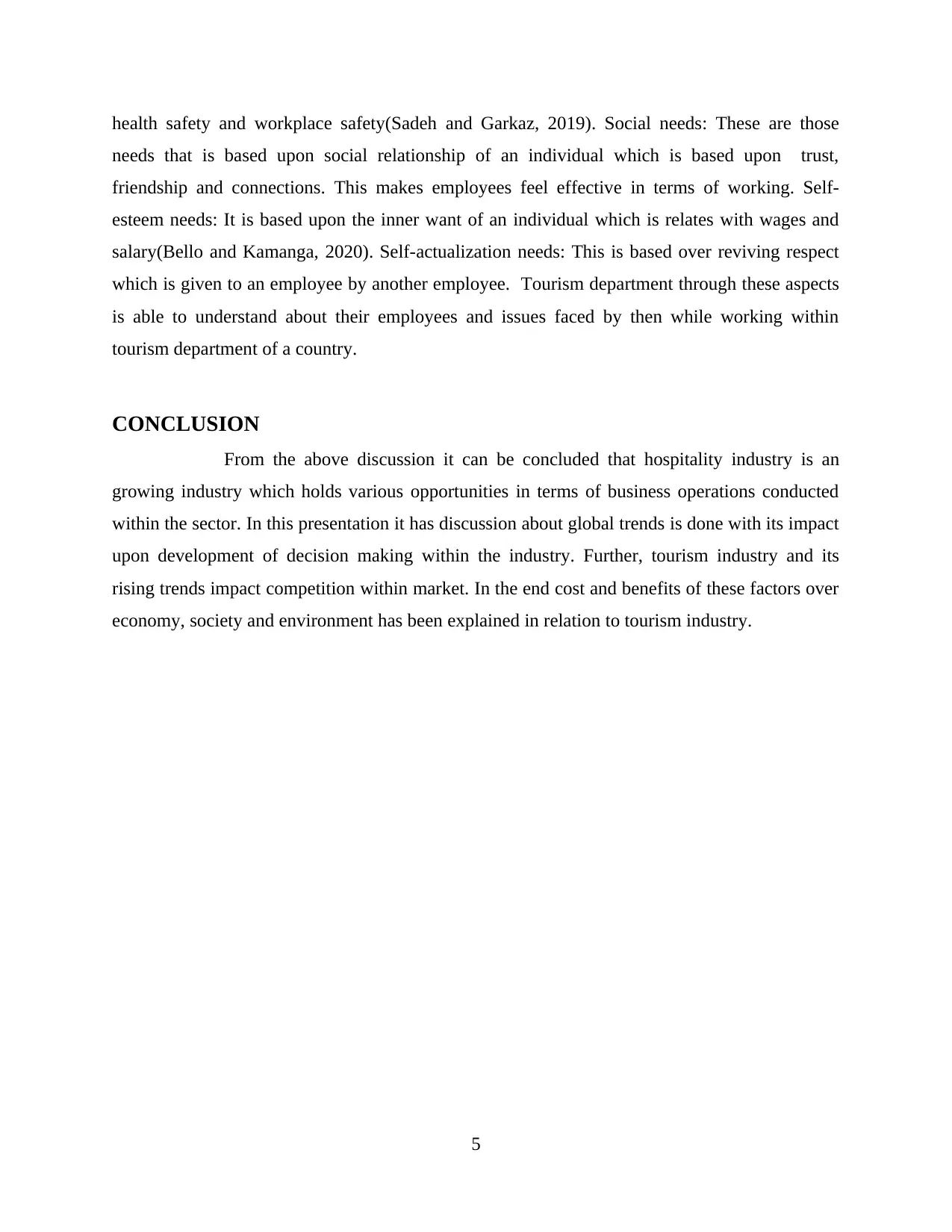
health safety and workplace safety(Sadeh and Garkaz, 2019). Social needs: These are those
needs that is based upon social relationship of an individual which is based upon trust,
friendship and connections. This makes employees feel effective in terms of working. Self-
esteem needs: It is based upon the inner want of an individual which is relates with wages and
salary(Bello and Kamanga, 2020). Self-actualization needs: This is based over reviving respect
which is given to an employee by another employee. Tourism department through these aspects
is able to understand about their employees and issues faced by then while working within
tourism department of a country.
CONCLUSION
From the above discussion it can be concluded that hospitality industry is an
growing industry which holds various opportunities in terms of business operations conducted
within the sector. In this presentation it has discussion about global trends is done with its impact
upon development of decision making within the industry. Further, tourism industry and its
rising trends impact competition within market. In the end cost and benefits of these factors over
economy, society and environment has been explained in relation to tourism industry.
5
needs that is based upon social relationship of an individual which is based upon trust,
friendship and connections. This makes employees feel effective in terms of working. Self-
esteem needs: It is based upon the inner want of an individual which is relates with wages and
salary(Bello and Kamanga, 2020). Self-actualization needs: This is based over reviving respect
which is given to an employee by another employee. Tourism department through these aspects
is able to understand about their employees and issues faced by then while working within
tourism department of a country.
CONCLUSION
From the above discussion it can be concluded that hospitality industry is an
growing industry which holds various opportunities in terms of business operations conducted
within the sector. In this presentation it has discussion about global trends is done with its impact
upon development of decision making within the industry. Further, tourism industry and its
rising trends impact competition within market. In the end cost and benefits of these factors over
economy, society and environment has been explained in relation to tourism industry.
5
Paraphrase This Document
Need a fresh take? Get an instant paraphrase of this document with our AI Paraphraser
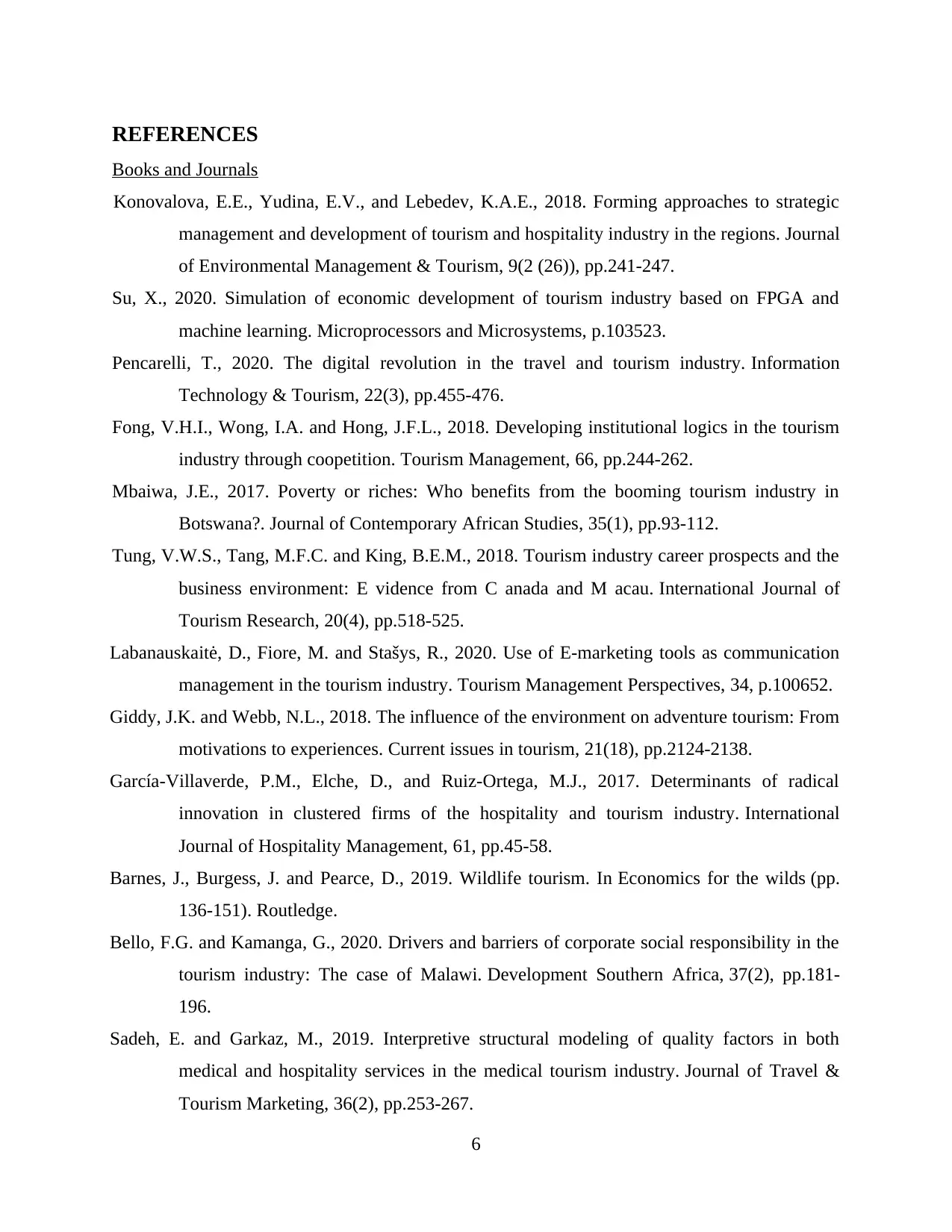
REFERENCES
Books and Journals
Konovalova, E.E., Yudina, E.V., and Lebedev, K.A.E., 2018. Forming approaches to strategic
management and development of tourism and hospitality industry in the regions. Journal
of Environmental Management & Tourism, 9(2 (26)), pp.241-247.
Su, X., 2020. Simulation of economic development of tourism industry based on FPGA and
machine learning. Microprocessors and Microsystems, p.103523.
Pencarelli, T., 2020. The digital revolution in the travel and tourism industry. Information
Technology & Tourism, 22(3), pp.455-476.
Fong, V.H.I., Wong, I.A. and Hong, J.F.L., 2018. Developing institutional logics in the tourism
industry through coopetition. Tourism Management, 66, pp.244-262.
Mbaiwa, J.E., 2017. Poverty or riches: Who benefits from the booming tourism industry in
Botswana?. Journal of Contemporary African Studies, 35(1), pp.93-112.
Tung, V.W.S., Tang, M.F.C. and King, B.E.M., 2018. Tourism industry career prospects and the
business environment: E vidence from C anada and M acau. International Journal of
Tourism Research, 20(4), pp.518-525.
Labanauskaitė, D., Fiore, M. and Stašys, R., 2020. Use of E-marketing tools as communication
management in the tourism industry. Tourism Management Perspectives, 34, p.100652.
Giddy, J.K. and Webb, N.L., 2018. The influence of the environment on adventure tourism: From
motivations to experiences. Current issues in tourism, 21(18), pp.2124-2138.
García-Villaverde, P.M., Elche, D., and Ruiz-Ortega, M.J., 2017. Determinants of radical
innovation in clustered firms of the hospitality and tourism industry. International
Journal of Hospitality Management, 61, pp.45-58.
Barnes, J., Burgess, J. and Pearce, D., 2019. Wildlife tourism. In Economics for the wilds (pp.
136-151). Routledge.
Bello, F.G. and Kamanga, G., 2020. Drivers and barriers of corporate social responsibility in the
tourism industry: The case of Malawi. Development Southern Africa, 37(2), pp.181-
196.
Sadeh, E. and Garkaz, M., 2019. Interpretive structural modeling of quality factors in both
medical and hospitality services in the medical tourism industry. Journal of Travel &
Tourism Marketing, 36(2), pp.253-267.
6
Books and Journals
Konovalova, E.E., Yudina, E.V., and Lebedev, K.A.E., 2018. Forming approaches to strategic
management and development of tourism and hospitality industry in the regions. Journal
of Environmental Management & Tourism, 9(2 (26)), pp.241-247.
Su, X., 2020. Simulation of economic development of tourism industry based on FPGA and
machine learning. Microprocessors and Microsystems, p.103523.
Pencarelli, T., 2020. The digital revolution in the travel and tourism industry. Information
Technology & Tourism, 22(3), pp.455-476.
Fong, V.H.I., Wong, I.A. and Hong, J.F.L., 2018. Developing institutional logics in the tourism
industry through coopetition. Tourism Management, 66, pp.244-262.
Mbaiwa, J.E., 2017. Poverty or riches: Who benefits from the booming tourism industry in
Botswana?. Journal of Contemporary African Studies, 35(1), pp.93-112.
Tung, V.W.S., Tang, M.F.C. and King, B.E.M., 2018. Tourism industry career prospects and the
business environment: E vidence from C anada and M acau. International Journal of
Tourism Research, 20(4), pp.518-525.
Labanauskaitė, D., Fiore, M. and Stašys, R., 2020. Use of E-marketing tools as communication
management in the tourism industry. Tourism Management Perspectives, 34, p.100652.
Giddy, J.K. and Webb, N.L., 2018. The influence of the environment on adventure tourism: From
motivations to experiences. Current issues in tourism, 21(18), pp.2124-2138.
García-Villaverde, P.M., Elche, D., and Ruiz-Ortega, M.J., 2017. Determinants of radical
innovation in clustered firms of the hospitality and tourism industry. International
Journal of Hospitality Management, 61, pp.45-58.
Barnes, J., Burgess, J. and Pearce, D., 2019. Wildlife tourism. In Economics for the wilds (pp.
136-151). Routledge.
Bello, F.G. and Kamanga, G., 2020. Drivers and barriers of corporate social responsibility in the
tourism industry: The case of Malawi. Development Southern Africa, 37(2), pp.181-
196.
Sadeh, E. and Garkaz, M., 2019. Interpretive structural modeling of quality factors in both
medical and hospitality services in the medical tourism industry. Journal of Travel &
Tourism Marketing, 36(2), pp.253-267.
6

7
⊘ This is a preview!⊘
Do you want full access?
Subscribe today to unlock all pages.

Trusted by 1+ million students worldwide
1 out of 9
Related Documents
Your All-in-One AI-Powered Toolkit for Academic Success.
+13062052269
info@desklib.com
Available 24*7 on WhatsApp / Email
![[object Object]](/_next/static/media/star-bottom.7253800d.svg)
Unlock your academic potential
Copyright © 2020–2026 A2Z Services. All Rights Reserved. Developed and managed by ZUCOL.


